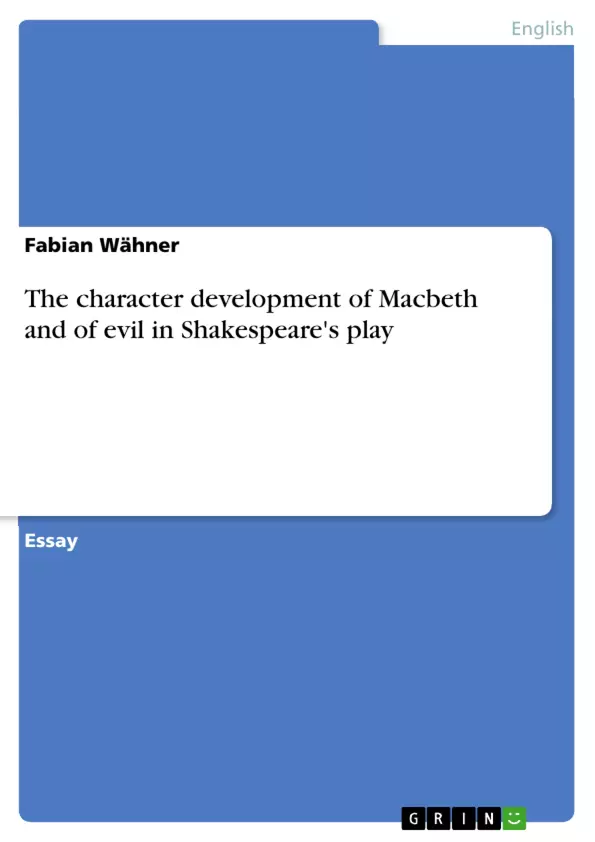"So foul and fair a day I have not seen" (Shakespeare Act I, Scene 3, l. 38) . These words mentioned by Macbeth, the main protagonist of the corresponding tragedy, echo one of the main themes of the whole play: nothing is as it seems to be. This central topic also arises in other tragedies by William Shakespeare. In "Macbeth", this motive appears in a much stronger way. This tragedy tells the journey of a former loyal and shining hero, who evolves into the center of evil.
"Macbeth" is considered as one of the most sinister tragedies of William Shakespeare. From the beginning on, the setting is depicted as a world full of nightmares, darkness, murder and treason. The play is constituted in a barren landscape, considered as a reference to hell. Most of the events happen during the nighttime, which supports this sinister impression. Some of the attempts that were made to analyze Macbeth, describe him as pure evil and a tyrant. A psychopath, who merciless defends his position as a king by killing every possible opponent who crosses his path. Other interpretations draw him as a victim, torn between the question of what is right and what is wrong and influenced by the evil that surrounds him. How can a man, who is firstly described as a hero and a loyal subject change in such a dramatic way? Which path does he take to become such a criminal individual like he mostly is described? What changes happen within his mind? These questions about the character development or in other words, the development of the evil within Macbeth are the core of this paper. In this research, the Reclam version of Shakespeare's "Macbeth", published 2011 in Ditzingen, Germany, is used.
Table of Contents
- Introduction
- The Character Development of Macbeth
- Conclusion
Objectives and Key Themes
This paper examines the character development of Macbeth in Shakespeare's tragedy. It explores how Macbeth, initially portrayed as a valiant hero, undergoes a transformation into a figure consumed by evil. The paper seeks to understand the factors that contribute to this change and analyze the internal struggles Macbeth faces.
- The impact of supernatural forces on Macbeth's actions
- The interplay between ambition and guilt in Macbeth's character
- The influence of external factors, such as the witches' prophecies and the environment of violence, on Macbeth's decisions
- The internal conflicts and moral dilemmas that Macbeth grapples with
- The portrayal of Macbeth as a complex character, caught between good and evil
Chapter Summaries
- Introduction: The introduction establishes the context of the play, highlighting the theme of deception and the contrasting nature of Macbeth's character. It introduces the central question of the paper: how does Macbeth evolve from a hero to a figure associated with evil?
- The Character Development of Macbeth: This chapter explores Macbeth's character development throughout the play. It examines his initial portrayal as a valiant warrior, his encounter with the witches, and the subsequent impact of their prophecies on his actions. The chapter analyzes Macbeth's internal struggles, his ambition, and the consequences of his choices.
Keywords
The central themes and concepts explored in this paper include character development, ambition, guilt, supernatural forces, moral dilemmas, and the contrasting nature of good and evil. The analysis focuses on Shakespeare's portrayal of Macbeth as a complex character and the factors that contribute to his transformation.
Frequently Asked Questions
What is the central theme of Shakespeare's "Macbeth" explored in this paper?
The central theme is the development of evil within the protagonist and the idea that "nothing is as it seems to be," tracking Macbeth's journey from a loyal hero to a criminal tyrant.
How is the setting of the play described?
The setting is depicted as a world of nightmares and darkness, featuring a barren landscape that serves as a reference to hell, with most events occurring at night.
Is Macbeth portrayed as a psychopath or a victim?
The paper discusses both interpretations: some see him as a psychopath defending his throne through murder, while others view him as a victim torn between right and wrong, influenced by external evil forces.
What role do the witches' prophecies play in Macbeth's development?
The prophecies act as a catalyst for Macbeth's ambition, triggering an internal struggle and leading him down a path of moral corruption and violence.
Which version of the play was used for this research?
The research is based on the Reclam version of "Macbeth," published in 2011 in Ditzingen, Germany.
- Citar trabajo
- Fabian Wähner (Autor), 2014, The character development of Macbeth and of evil in Shakespeare's play, Múnich, GRIN Verlag, https://www.grin.com/document/341282



